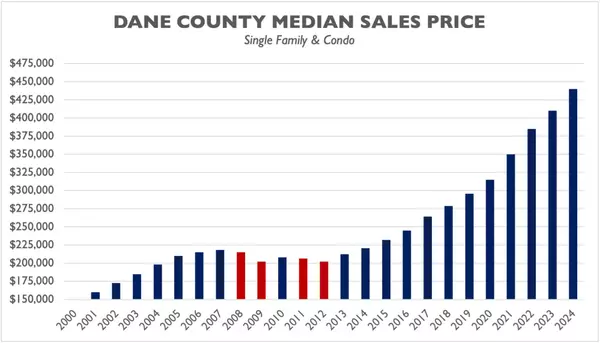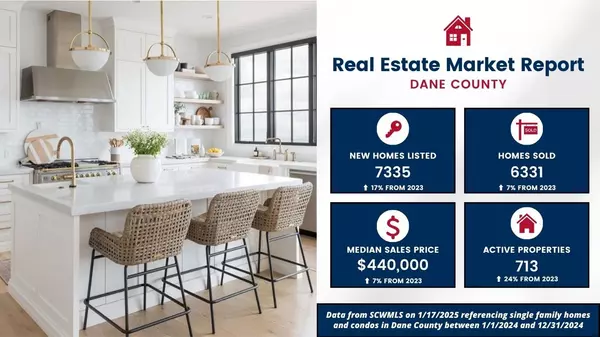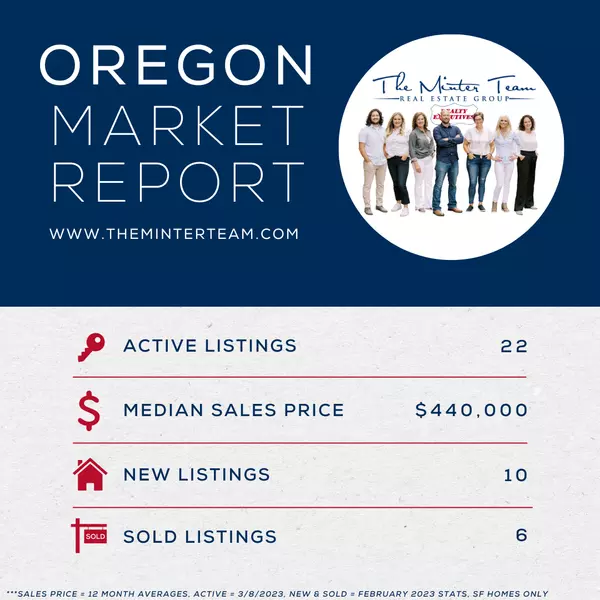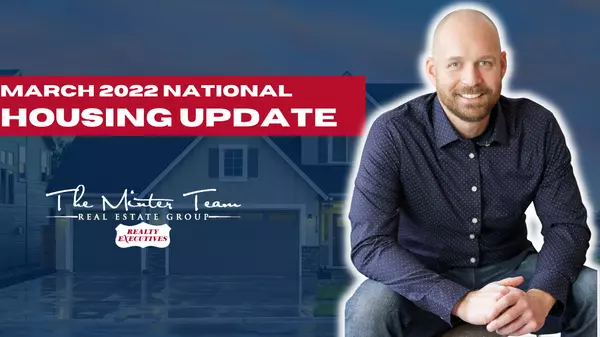
Waiting for Housing Costs to Come Down? You May Want to Change Your Strategy!
I want to take you back to a video we shot in 2022 (you’ll find it below). At the time, many people were convinced a housing crash was inevitable. Social media was flooded with “experts” warning buyers to hold off, claiming prices would plummet and rates would normalize. Some buyers hesitated,
Read More

Dane County Real Estate 2025: Signs of Balance Returning
Entering 2024, our local market was filled with hope following a challenging 2023 that delivered the fewest home sales since the Great Recession. As we move into 2025, that hope has begun to materialize into tangible improvements. Our 2024 total of just over 6,300 home sales marked a 7% increase fr
Read More

Dane County Real Estate: Trends and Insights as We Look Ahead to 2025
As we near the end of 2024, it’s a good time to take a closer look at the state of the Dane County real estate market. Understanding where we’ve been can provide solid context for where we are going heading into 2025. Interest Rates In our July edition, we shared that many experts were forecasting
Read More

Dane County Home Prices Will Continue to Rise
In the world of real estate, the ups and downs of home values are the subject of much speculation and analysis. Yet, when it comes to Dane County's market, a few key factors make a compelling case for why we don't foresee a downturn in home values anytime soon. Here's a look into the dynamics at p
Read More

The Cost of Waiting: How Delaying Home Buying Could Impact Your Finances
Are you dreaming of owning a home but have been waiting for the "perfect time" when prices drop? It's a common belief that when home prices surge, a correction is bound to happen. However, in today's real estate market, waiting might not be the wisest financial move. Let's delve into the insights f
Read More

Exploring Madison's Low Stress Levels, Housing Affordability from a Historical View, and the Rent vs. Own Debate
This week in real estate... 1. Madison, Wisconsin is making waves as one of the least stressed cities in the country. According to a recent study mentioned in the NBC15 article, "Madison Ranks Among the Least Stressed Cities in the Country," our city earned an impressive ranking of 171 out of 182 o
Read More

Understanding the Oregon, Wisconsin Real Estate Market: Interest Rates, Affordability, and Supply & Demand
If you're considering a move or are interested in the Oregon, Wisconsin housing market, it's important to stay informed about the factors that have shaped its current state. In this blog post, we'll delve into the recent trends and challenges affecting the market, particularly focusing on
Read More

Oregon WI Real Estate Market Report April 2023
Let's dig in to see what is happening in our local Oregon market with a few key points. 1. Buyer Demand : Overall showing activity remains DOWN in Oregon when compared to the average for this time of year. This is an indicator of buyer demand. However, I wouldn't read too much into this as it
Read More

Madison, WI Housing Market Update - March 2023
Recently there have been a lot of of opinions on the state of the market so let's boil it down real quick to see what is happening in our local housing market with a few key points. 1. Buyer Demand: Anecdotally buyer demand has not decided to take a dip this spring. After some struggles this
Read More

Oregon, Wisconsin Housing Market - March 2023
"How's the Market?" That's probably the question we hear more than anything else. Recently there have been a lot of of opinions on the state of the market so let's boil it down real quick to see what is happening in our local Oregon market with a few key points. 1. Buyer Demand: After
Read More

Are Recent Home Buyers in Trouble?
This idea that the world is going to crash and everybody's gonna end up upside down in their mortgage is a myth that has been perpetuated by the media and doomsday lovers who thrive on the drama and bad news. However, it is not true - it is not a bad time to buy a home, and in Madison Wisconsin, th
Read More

Dane County Housing Market Update - July 2022
July 2022 - Dane County Market Update Summer is in full swing, which means campfires and cookouts, vacations, festivals and swimming. But this year, summer also brings with it concerns about inflation, rising interest rates and that big, scary word "crash". Depending on where you place your focus a
Read More

Oregon, WI Real Estate Market Update - July 2022
July 2022 - Oregon, WI Market Update Hey there, Oregon. There is lots of chatter happening out there about the economy and housing market. Inflation, interest rates and home prices are going through the roof and the media loves using words like bubble, crash and recession. But where are we really h
Read More

National Housing Market Update - May 2022
National Housing Market Update - May 2022 Rising interest rates, inflation concerns and supply-demand issues have people talking crash, bubble and recession, but is it time to be concerned? Spoiler alert, the answer is no. So let's take a look at why this market might not be as scary as the media i
Read More

Oregon, WI Housing Market Update - April 2022
April 2022 Housing Market - Oregon, WI Hey there, Oregon. Jeff Minter here, team lead for the Minter Team at Realty Executives Cooper Spransy and fellow Oregonian, Oregonite; I should really know that. Anyway, let's get diving into the numbers and see what's going on in our local real estate market
Read More

National Housing Market Update - April 2022
April 2022 - National Housing Market Update When I think back over the last decade, I think of a lot of people who were concerned about rising home prices, and whether or not they should purchase a house with prices going the direction that they were going. Let's face it, that's a legitimate conc
Read More

Oregon, WI Housing Market Update - March 2022
Oregon, WI Housing Market Update - March 2022 Hey there, Oregon. Spring is here so what does that mean for our local market? I drive around town and I don't see any for sale signs out there. Prices are rising on everything from gas to food to definitely houses, and who knows where global events are
Read More

Dane County Housing Market Update - March 2022
Dane County Housing Market - March 2022 Hey, Dane County, welcome to another spring market. If you paid attention in recent years, you know that this is the time of year, that the crazy stories start to emerge. Just how is the local market performing? Is now a good time to sell your house or should
Read More

National Housing Market Update - March 2022
National Housing Market Update - March 2022 I know that everywhere we look, prices are on the rise. From food to gas, we are paying more, and housing costs are not immune to rising prices. But there can be huge benefits to owning a home when other prices are rising. Inflation gives homeowners a b
Read More

February 2022 - Oregon, WI Housing Market Update
Oregon, WI: Market Update, February 2022 Hey there, Oregon. How is the market? Are we in a bubble? Are things going to crash? Is it ever going to be okay to buy a house? I get asked these questions all the time and I get it. When we look around town, there's not a lot of for sale signs out in yard
Read More
Categories
Recent Posts










